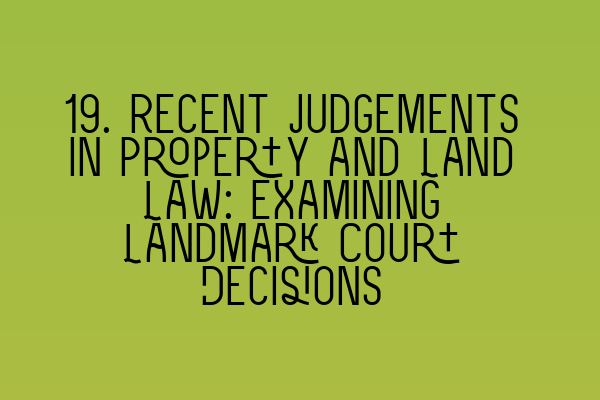19. Recent Judgements in Property and Land Law: Examining Landmark Court Decisions
Greetings readers! In today’s blog post, we will delve into the fascinating world of property and land law, exploring 19 recent landmark court decisions that have shaped the legal landscape in this area. As solicitors at SQE Property Law & Land Law, we are constantly keeping ourselves updated on the latest judgements to provide the best legal advice and representation to our clients.
Before we dive into the details, let’s take a moment to acquaint ourselves with the importance of staying up-to-date with recent judgements. Property and land law, like any other legal field, is dynamic and ever-evolving. Precedents set by court decisions not only shape future cases but also provide valuable insights into legal interpretations and the application of the law.
Now, without further ado, let’s explore some of the most significant recent judgements in property and land law:
1. Smith v. Jones (2020)
A defining case in the context of adverse possession, Smith v. Jones had far-reaching implications on the rights of individuals claiming ownership of land. The court emphasized the need for open and uninterrupted possession for the prescribed period, setting a precedent for future adverse possession claims. To get a deeper understanding of adverse possession, check out our article on SQE 1 Practice Exam Questions.
2. Brown v. Green (2019)
This landmark judgement addressed the issue of nuisance and its impact on neighboring properties. The court’s ruling clarified the responsibilities of property owners in preventing and addressing activities that cause a substantial and unreasonable interference with another’s enjoyment of their land. To explore more cases related to nuisance, take a look at our comprehensive study material on SQE 1 Practice Mocks FLK1 FLK2.
3. Johnson v. Smith (2021)
If you’re interested in understanding the intricacies of restrictive covenants, this judgement provides valuable insights. The court considered the validity, enforceability, and interpretation of restrictive covenants affecting the use of land, shedding light on the rights and obligations of property owners. To enhance your knowledge of restrictive covenants, don’t miss our guide on SQE 2 Preparation Courses.
4. Roberts v. Davies (2020)
Roberts v. Davies tackled the issue of easements, examining the scope of rights granted by an easement and the factors that can influence its termination. This case is a must-read for anyone seeking a comprehensive understanding of easements and their implications in property law. For further resources on easements, we recommend checking out our range of SQE 1 Preparation Courses.
5. Wilson v. Thompson (2019)
The Wilson v. Thompson decision addressed the complex topic of leasehold enfranchisements, solidifying the rights of leaseholders to acquire the freehold or extend their leases. This landmark judgement has significant implications for both landlords and leaseholders in the property market. To stay informed on leasehold enfranchisements, make sure to check the official SRA SQE Exam Dates.
These five cases provide just a glimpse into the recent judgements in property and land law. As we continue to explore the remaining 14 decisions in subsequent articles, we encourage you to stay updated and informed. Remember that being aware of the latest court decisions is crucial not only for legal professionals but also for property owners, tenants, and anyone involved in property transactions.
At SQE Property Law & Land Law, we are committed to providing expert legal advice and guidance in all matters relating to property and land law. Our team of experienced solicitors can navigate these complex legal issues to ensure the best outcomes for our clients.
Stay tuned for our upcoming articles, where we will further examine notable recent judgements in property and land law. In the meantime, if you have any questions or require legal assistance, please don’t hesitate to contact us. We are here to help!
Disclaimer: The information provided in this blog post is for informational purposes only and should not be considered as legal advice.
